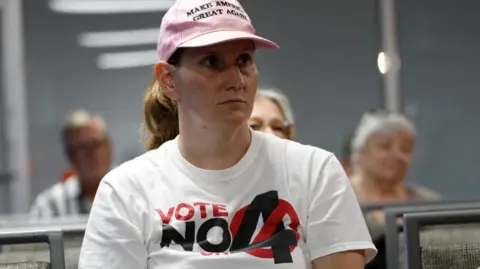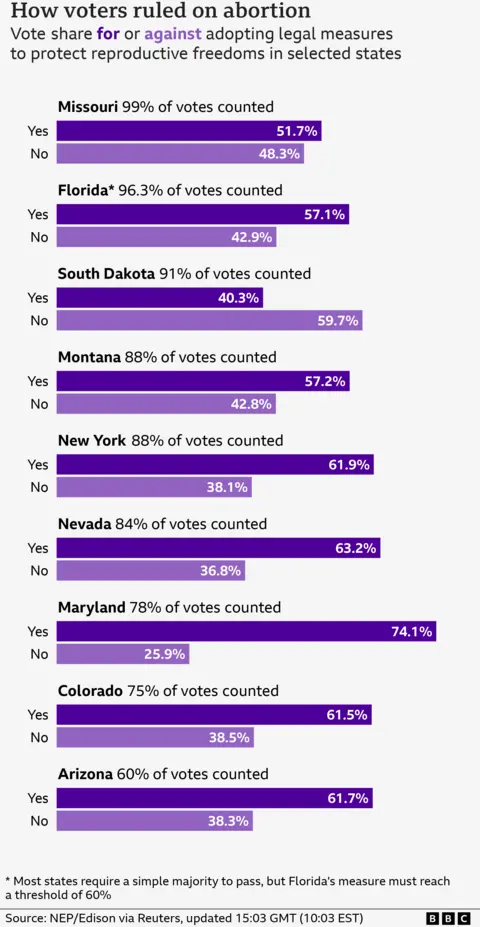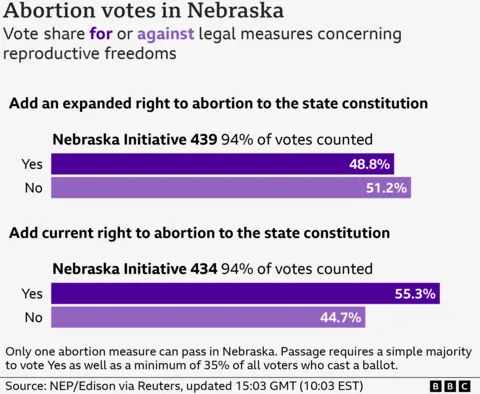Seven states expand abortion protections as Florida ballot fails
 Reuters
ReutersSeven states in the US have approved measures to protect or expand abortion rights, but bids to restore protections for the procedure failed in Florida, South Dakota and Nebraska.
The mixed results came as the Republican Party made widespread gains in contests across the US, propelling Donald Trump to a decisive victory.
Voters had been asked to weigh in on questions about abortion access in 10 states in this election - the first major presidential contest since the US Supreme Court struck down a national right to the procedure two years ago.
The state-level fights were an effort by abortion rights campaigners to claw back or preserve access to practice, after many states barred or imposed restrictions on abortion following the ruling.
Democrats had also hoped the issue would help galvanise voters to their side this election, crediting anger over the issue with helping the party to a better-than-expected performance in midterm elections in 2022.
Vice-President Kamala Harris leaned into the issue throughout her campaign, appealing to women across party lines.
But that momentum did not appear consistently this year, as exit polls suggested abortion ranked below topics such as the economy and democracy.

In Missouri, which backed Donald Trump decisively, abortion rights campaigners still notched a major victory, as voters approved an amendment intended to overturn a near-total abortion ban in the state.
In Arizona, another state Trump is leading, more than 60% of voters backed an amendment to protect the right to abortion until the point of viability - roughly 24 weeks. The measure extends access from the current 15 weeks currently allowed under state rules.
But a similar proposal in Florida fell just short of the threshold of 60% support needed in order to pass, winning just 57% support.
The defeat will let stand the strict law the state enacted earlier this year, banning abortion after the sixth week of pregnancy, with limited exceptions.
The measure had faced strong opposition from Republican Governor Ron DeSantis, who used state resources to persuade voters to vote “no”.
It also became a political headache for Trump, who initially appeared to support the change, but later said he would vote against it after pushback from within his own party.
Betsy Linkhorst, a first-time voter in Florida, said the result in her state left her "heartbroken, scared and frankly, worried for the future".
"This was such an important opportunity to protect women’s rights and our ability to make decisions over our own bodies," the 18-year-old said.
Maria McNally, who voted against the amendment, said she believed that it would have allowed abortions too far into pregnancy.
“I’m happy it failed,” she said.

Voters in the US facing abortion questions on the ballot this year came from states with a wide range of different laws surrounding abortion.
The questions they were asked to decide also varied, though most initiatives proposed to establish a state right to abortion until foetal viability - about the 24th week of pregnancy.
In previous election cycles, campaigns to restore or protect abortion access by using state-level ballot propositions had met with success, including in reliably conservative states such as Kansas.
But the results from this election largely cemented the reality that women in the US face widely different access to abortion depending on where they live.
Voters in Nebraska and South Dakota rejected measures that would have expanded access, while in Maryland and Colorado, where abortion is currently legal, voters approved measures to enshrine a right to the procedure in the state constitutions.
In Colorado's case, the amendment will also expand access, allowing abortion to be covered under government health insurance plans.
In Montana and Nevada, where abortion is currently legal until about viability, voters approved measures to codify that right in the constitution.
In Nevada, a majority of voters will have to approve the measure again in two years for the amendment to be enacted.
New York, where abortion is legal until viability, approved an amendment that would bar discrimination due to pregnancy or reproductive health.
In Nebraska, voters faced two duelling abortion initiatives. They rejected one that would have made abortion a right until viability and approved the state's current rules, which ban abortion after the 12th week of pregnancy, with some exceptions, including incest, rape and saving the life of the mother.


- UNITED KINGDOM: What does Trump victory mean for UK?
- GLOBAL: What Trump's win means for Ukraine, Middle East and China
- AFRICA: Trade, aid, security: What does Trump's win mean for Africa?
- ANALYSIS: Analysis: Will Trump's victory spark a global trade war?
- IN PICS: Different lives of Harris and Trump
- IN FULL: All our election coverage in one place
